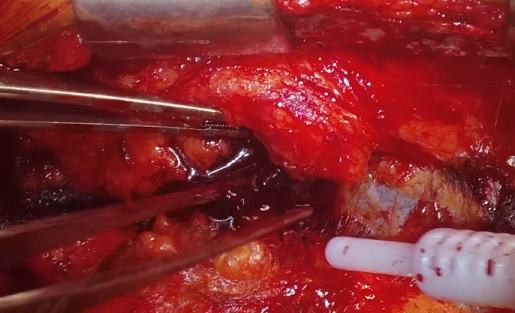Nikhil Prasad Fact checked by:Thailand Medical News Team Dec 04, 2024 1 year, 2 weeks, 2 days, 14 hours, 29 minutes ago
Medical News: A recent case report highlights an intriguing link between COVID-19 and a rare cardiovascular condition known as aortic dissection. The study, conducted by researchers from the Infectious Diseases Department at Islamic Azad University of Medical Sciences in Tehran, Iran, and the Health Policy Center at Shiraz University of Medical Sciences, describes the case of a 68-year-old Iranian male. Despite showing initially mild COVID-19 symptoms, the patient developed a massive and fatal aortic dissection within days of hospitalization. This
Medical News report explores the findings and their implications.
 Case Study Highlights That COVID-19 Can Cause Massive Aortic Rupture
Case Study Highlights That COVID-19 Can Cause Massive Aortic Rupture
Aortic dissection is a life-threatening condition where the inner layer of the aorta, the largest artery in the body, tears, allowing blood to flow between the layers of the vessel wall. This separation can lead to severe complications, including organ damage, stroke, and fatal internal bleeding. Age, male gender, and pre-existing conditions such as hypertension or connective tissue disorders are known risk factors for this condition. However, this particular case reveals a potential association between COVID-19 and heightened cardiovascular risk, even in patients without significant underlying conditions.
The Case Study
The patient initially presented with fever, chills, loss of smell, and taste - classic symptoms of COVID-19. His oxygen saturation was stable at 95%, and a chest CT scan showed mild lung involvement with ground-glass opacities. He received standard COVID-19 treatment, including remdesivir, heparin, dexamethasone, and pantoprazole.
Four days into his hospital stay, his condition took a turn for the worse. His oxygen saturation dropped to 90%, despite supplementary oxygen, and his symptoms worsened, including a severe productive cough. Elevated D-dimer levels, an indicator of potential blood clotting, raised concerns. Over the next few days, he experienced worsening respiratory distress, blood-streaked sputum, and extreme fatigue. On the sixth day, he reported sudden, severe chest pain and shortness of breath. A subsequent CT angiography revealed a Stanford type A aortic dissection, which had progressed from the aortic root to the abdominal aorta.
Exploring the Link
This case sheds light on a potential association between COVID-19 and aortic dissection. The virus is known to affect the cardiovascular system in various ways, including causing blood clotting disorders, myocardial injury, and inflammatory responses. These factors may weaken the walls of blood vessels, increasing the risk of conditions like aortic dissection.
The researchers proposed several mechanisms to explain this association:
-Direct Vascular Damage: The SARS-CoV-2 virus binds to angiotensin-converting enzyme 2 (ACE2) receptors, which are abundant in vascular endothelial cells. This binding can lead to inflammation and damage to the aortic wall.
-Cytokine Storms: Severe COVID-19 can trigger
an overactive immune response, known as a cytokine storm, which may exacerbate vascular damage and lead to conditions such as plaque rupture or dissection.
-Hypercoagulability: COVID-19 is linked to increased blood clotting, which may further contribute to the development of vascular complications.
This case study highlights that the interplay between COVID-19 and cardiovascular conditions like aortic dissection is still being explored. However, this case underscores the need for vigilance and timely interventions in managing such patients.
Treatment Challenges
The treatment of aortic dissection is complex and often requires immediate surgical intervention. In this case, despite preparations for emergency vascular surgery, the patient succumbed to his condition before the procedure could be performed. The researchers emphasized that delays in diagnosing and treating such conditions during the COVID-19 pandemic have added to the challenge, as strained healthcare systems and patient reluctance to seek care have often resulted in poor outcomes.
Broader Implications
The findings from this case add to the growing body of evidence linking COVID-19 to severe cardiovascular complications. The pandemic has highlighted the need for multidisciplinary approaches to managing critically ill patients, especially those presenting with atypical symptoms or complications.
The study also underscores the importance of understanding the long-term effects of COVID-19 on cardiovascular health. As more cases emerge, further research is needed to elucidate the mechanisms underlying these associations and develop targeted strategies for prevention and treatment.
Conclusion
This case serves as a stark reminder of the far-reaching impact of COVID-19, extending beyond its respiratory manifestations. The potential link between COVID-19 and aortic dissection highlights the need for continued vigilance in diagnosing and managing cardiovascular complications in patients with the virus. Multidisciplinary care, timely interventions, and further research into the mechanisms driving these associations will be crucial in improving patient outcomes.
The study findings were published in the peer-reviewed journal: Clinical Case Reports.
https://onlinelibrary.wiley.com/doi/10.1002/ccr3.9659
For the latest COVID-19 News, keep on logging to Thailand
Medical News.
Read Also:
https://www.thailandmedical.news/news/covid-19-can-cause-cervical-arterial-dissections-or-tears-in-the-wall-of-the-large-blood-vessel-in-the-neck
https://www.thailandmedical.news/news/doctors-warn-that-covid-19-can-cause-spontaneous-esophageal-rupture
https://www.thailandmedical.news/news/breaking-covid-19-news-case-study-shows-that-even-asymptomatic-sars-cov-2-infections-can-lead-to-spontaneous-bowel-perforations
https://www.thailandmedical.news/news/breaking-pediatricians-warn-that-covid-19-can-cause-gastric-perforations-in-new-borns
